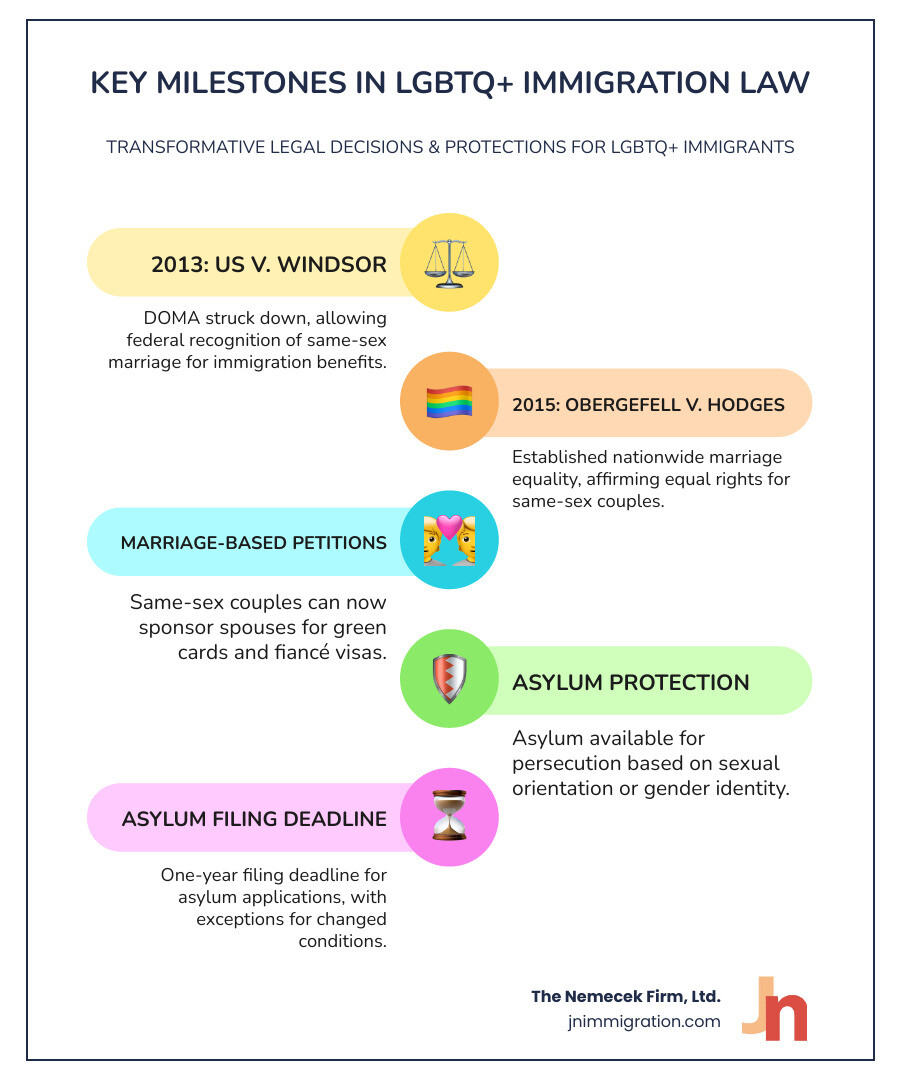
An LGBT immigration attorney specializes in helping LGBTQ+ individuals and couples steer unique immigration challenges, including marriage-based green cards, asylum claims based on persecution, and family reunification.
What an LGBT Immigration Attorney Can Help You With:
The legal landscape for LGBTQ+ immigrants has changed dramatically. Before 2013, the Defense of Marriage Act (DOMA) prevented same-sex couples from accessing federal immigration benefits. The Supreme Court’s decisions in United States v. Windsor and later Obergefell v. Hodges gave same-sex married couples the same rights as opposite-sex couples.
But legal equality doesn’t mean the process is easy. LGBTQ+ immigrants still face unique challenges, like proving relationship validity when documentation is limited, navigating bias, and fleeing persecution.
A specialized LGBT immigration attorney understands these challenges. They know how to build strong cases, address cultural sensitivities, and advocate for clients. Whether you’re seeking to sponsor a spouse, apply for asylum, or defend against deportation, having an attorney who understands your specific situation can make all the difference.

Glossary for LGBT immigration attorney:
The path for LGBTQ+ individuals seeking to build a life in the United States hasn’t always been open. For decades, the immigration system denied same-sex couples the rights that opposite-sex couples took for granted. Understanding this history shows how far we’ve come and reminds us why specialized legal help from an LGBT immigration attorney remains so important.
Before 2013, the Defense of Marriage Act (DOMA) prevented the federal government from recognizing same-sex marriages, blocking bi-national couples from all immigration benefits.
Two Supreme Court decisions fundamentally reshaped immigration rights for LGBTQ+ couples.
In 2013, United States v. Windsor struck down the core of DOMA, ruling that the federal government could no longer deny benefits to legally married same-sex couples. This opened the door for U.S. citizens to sponsor their same-sex spouses for green cards for the first time.
The final barrier fell in 2015 with Obergefell v. Hodges. The Supreme Court established a nationwide right to marry for same-sex couples, guaranteeing equal treatment and equal dignity across all federal programs, including immigration. After Obergefell, a same-sex marriage performed anywhere in the U.S. or in another country where it is legal would be recognized by USCIS.

These landmark decisions dismantled the legal walls that kept families apart, representing decades of advocacy and courage.
We’re proud to provide More info about our LGBTQ+ Immigration Lawyer services to help you through every step of this process.
Today, in the post-Obergefell era, same-sex married couples have equal access to immigration benefits. You can sponsor your spouse for a green card, file for a K-1 fiancé(e) visa, and include stepchildren in family-based petitions.
However, legal equality on paper doesn’t eliminate all challenges in practice. Some LGBTQ+ couples still face extra scrutiny when proving their relationship is genuine, especially if they had to hide their relationship in the past. Transgender and non-binary immigrants can face delays if name and gender marker changes on documents are inconsistent.
Furthermore, many people still flee countries where being LGBTQ+ is criminalized. While asylum protection exists, the process is complex. Ongoing advocacy continues to address these gaps, and it is important to stay informed as policies can shift.
That’s why working with an LGBT immigration attorney who understands both the legal framework and the lived experiences of LGBTQ+ immigrants is so crucial. We stay current on legal reforms and USCIS policy to build cases that address the unique circumstances our clients face.
LGBTQ+ individuals now have clear pathways to build their lives in the United States, but the journey often involves unique documentation challenges and legal nuances. Whether you’re hoping to reunite with a spouse or flee persecution, understanding these pathways is the first step. An LGBT immigration attorney brings the legal knowledge and cultural understanding to help build a strong case.

As a U.S. citizen or lawful permanent resident, you can sponsor your same-sex spouse for a green card. Thanks to Obergefell v. Hodges, your marriage is recognized for all federal immigration purposes. The process begins with filing Form I-130, Petition for Alien Relative.
The core of the petition is proving your marriage is “bona fide”—that you married for love, not just for an immigration benefit. You’ll need evidence of a shared life, such as joint bank accounts, leases, and photos. An experienced LGBT immigration attorney knows how to build a compelling case even if you have fewer traditional documents due to past discrimination.
If your marriage is less than two years old when the green card is approved, your spouse will receive conditional permanent residency. You will later file jointly to remove these conditions.
Only a legal marriage qualifies for immigration benefits; civil unions and domestic partnerships do not. If you previously filed as “single” before marriage equality, USCIS will not hold that against you in a new petition based on your legal marriage. The K-1 fiancé(e) visa is another option, allowing your foreign partner to enter the U.S. to marry you.
For many LGBTQ+ individuals, immigration is about survival. If you fear returning to your home country because of your sexual orientation or gender identity (SOGI), you may qualify for asylum.
Asylum is available if you can show a well-founded fear of persecution based on who you are. This can include violence, threats, imprisonment under anti-LGBTQ+ laws, or severe discrimination. You must also show that your government is unable or unwilling to protect you.
Generally, you must file for asylum within one year of your last arrival in the U.S., but there are exceptions for changed country conditions or extraordinary personal circumstances. The process is deeply personal and requires detailed evidence.
Withholding of removal is another form of protection that prevents deportation to a country where you face a clear probability of persecution, though it does not provide a path to a green card.
Get expert help with Asylum and Refugee Services from attorneys who understand these unique challenges. For a comprehensive overview, Read our Asylum Lawyer Ultimate Guide. Building a strong asylum case requires specialized knowledge and fierce advocacy for your safety. The stakes couldn’t be higher.
The U.S. immigration system is complex, and for LGBTQ+ individuals, it often contains unique problems. A specialized LGBT immigration attorney is essential for navigating these challenges with legal expertise and genuine empathy.
Even with legal equality, real-life complications remain. An experienced attorney knows how to address them proactively.

These aren’t just technicalities; they are deeply personal aspects of your life that deserve careful, sensitive handling.
Legal knowledge alone isn’t enough. Cultural competency—a genuine understanding of the LGBTQ+ experience—is what makes an attorney truly effective.
Let’s clear up some misconceptions that create unnecessary worry for LGBTQ+ individuals navigating immigration:
The immigration journey can feel overwhelming, and when you add the unique challenges faced by LGBTQ+ individuals, having the right support network is essential. The good news? You’re not alone. A strong community of legal advocates, mental health professionals, and support organizations stands ready to help.
Finding the right legal help can make all the difference. While many non-profit organizations provide valuable support and advocacy for LGBTQ+ immigrants, it’s crucial to have an attorney who can represent your specific case.
For official forms, processing times, and government guidance, the U.S. Citizenship and Immigration Services (USCIS) website is your primary source of information. You can find everything at The official website of U.S. Citizenship and Immigration Services.
Dedicated LGBT immigration attorneys like our team work to create a vital support network for the community. Together, we’re here to help you succeed.
Immigration is stressful, and the emotional toll can be significant. Anxiety, stress, and trauma are common experiences, which is why mental health support is just as important as legal help.
The Trevor Project provides crisis intervention and suicide prevention services specifically for LGBTQ+ young people under 25. If you or someone you know needs immediate help, their resources can be lifesaving. Reach out at The Trevor Project.
Many community centers offer holistic support services that include counseling and community building alongside legal aid. This integrated approach recognizes that your well-being matters just as much as your legal case. Finding a culturally sensitive therapist who understands both LGBTQ+ and immigrant experiences can be incredibly healing. Don’t hesitate to ask for help—reaching out shows strength.
We hear certain questions time and again from our LGBTQ+ clients. They’re the same concerns that keep people up at night, wondering if their dreams of building a life in the U.S. are even possible. As LGBT immigration attorneys, we want to address these head-on with clear, honest answers based on current law and our real-world experience.
Absolutely, yes. Following the Supreme Court’s ruling in Obergefell v. Hodges, legally married same-sex couples are treated identically to opposite-sex couples for all immigration purposes. That includes sponsoring a spouse for a green card.
The process starts with filing Form I-130, Petition for Alien Relative, with USCIS. The most important thing is that your marriage must be legally recognized in the jurisdiction where it was performed. It doesn’t matter if you got married in Massachusetts or Madrid—if it was legal there, it’s recognized by U.S. immigration law.
Now, here’s where having an LGBT immigration attorney becomes valuable: you’ll need to prove your marriage is “bona fide,” meaning it’s a real, genuine relationship and not just for immigration benefits. While same-sex marriages receive the same scrutiny as opposite-sex marriages, some couples face unique documentation challenges due to past discrimination. We can guide you through what evidence USCIS needs to see—joint bank accounts, lease agreements, photos, affidavits from friends and family—and help you build a strong case even if your paper trail isn’t traditional.
This is where asylum protection becomes a lifeline. If you have a well-founded fear of persecution in your home country based on your sexual orientation or gender identity, you may be eligible to apply for asylum in the U.S.
To qualify, you need to demonstrate that you’ve been harmed or have genuine reason to fear future harm or death because of who you are, and that your home country’s government is unable or unwilling to protect you. This persecution can take many forms—physical violence, threats, discriminatory laws that criminalize your identity, or even societal ostracization so severe it amounts to persecution.
There’s usually a one-year filing deadline from your last arrival in the U.S., but exceptions exist if you can show “changed country conditions” or extraordinary circumstances that prevented you from filing sooner. The asylum process requires detailed documentation, compelling personal testimony, and often expert statements about conditions in your home country. It’s emotionally demanding, which is why having an Asylum Seeker Lawyer who understands the nuances of LGBTQ+ persecution can make all the difference in your case.
Unfortunately, no, they generally are not. This is one of the toughest conversations we have with clients who thought their civil union or domestic partnership would be sufficient.
For U.S. immigration purposes, only a legally recognized marriage qualifies for family-based benefits. While civil unions and domestic partnerships offer certain rights and protections at the state or local level, federal immigration law doesn’t consider them marriages. That means they won’t allow you to sponsor a partner for a green card or access other family-based immigration pathways.
If you’re currently in a civil union or domestic partnership and want to pursue immigration benefits, you’ll need to get legally married in a jurisdiction where same-sex marriage is recognized. We know this can feel like an extra hurdle, especially if you’ve already made a legal commitment to each other, but it’s the current requirement under federal law. We’re here to help you understand your options and steer the path forward.
The journey toward U.S. immigration for LGBTQ+ individuals has transformed dramatically over the past decade. What was once a landscape of legal barriers has opened into a path of real possibilities. But let’s be honest—clearer doesn’t mean simple. The immigration system remains complex, filled with paperwork, deadlines, and procedures that can feel overwhelming, especially when your rights, your family, and your safety are on the line.
Throughout this guide, we’ve explored how landmark court decisions changed everything, how various pathways like family-based petitions and asylum can help you build your life here, and why having an LGBT immigration attorney who truly understands your experience makes all the difference. We’ve also debunked myths and connected you with resources designed specifically for the LGBTQ+ community.
Here’s what we know: understanding your rights is just the beginning. Knowing which legal pathway fits your situation, gathering the right documentation, and presenting your case effectively—these require specialized expertise and cultural competency. When you’re proving a bona fide marriage that may have fewer traditional documents, or sharing deeply personal stories of persecution for an asylum claim, you need someone in your corner who gets it. Someone who sees you, respects your dignity, and fights for your future.
At The Nemecek Firm, Ltd., we’re proud to offer exactly that kind of representation. We’re a Columbus, Ohio-based immigration law firm, but we work with clients across the U.S. and abroad. Our specialized expertise in LGBTQ+ immigration means we understand the unique challenges you face—from name and gender marker changes to addressing bias in interviews to building asylum cases that capture the full reality of persecution. Attorney Nemecek’s recognition in media and his commitment to affordable, high-quality legal services means you get experienced advocacy without breaking the bank.
We don’t just process paperwork. We listen. We build strategies custom to your specific situation. We advocate fiercely for your rights. And we walk alongside you through every step of what can be a long and emotionally taxing process, offering the kind of compassionate partnership that transforms anxiety into confidence.
Your immigration goals matter. Whether you’re sponsoring your spouse, seeking protection from persecution, or navigating any other aspect of LGBTQ+ immigration, you deserve an attorney who brings both legal excellence and genuine understanding to your case.
If you’re ready to take the next step in your immigration journey, we’re here to help. Our team of experienced professionals is ready to provide the guidance, support, and representation you need to achieve success. Contact our Columbus immigration lawyer today for a consultation, and let’s start building your path forward together.